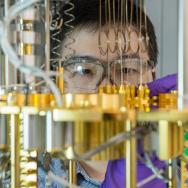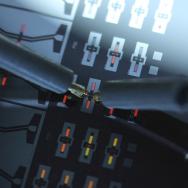As part of a nationwide initiative to boost research in quantum science, the National Science Foundation will establish a $25 million institute in Chicago to investigate quantum sensing for biology and train the quantum workforce. Headquartered at the University of Chicago and in partnership with Chicago State University, the University of Illinois at Chicago and Harvard University, the institute will be funded for five years.
The goals of the Quantum Leap Challenge Institute for Quantum Sensing for Biophysics and Bioengineering (QuBBE) are twofold: to pioneer new ways to use quantum technology in biology, and to develop the quantum workforce through STEM education and outreach.
“This institute is designed specifically to foster cross-disciplinary collaborations that are not incremental, but rather paradigm-shifting,” said Greg Engel, professor of chemistry at the University of Chicago and the new institute’s director. “It’s rapidly becoming clear that quantum sensing could be transformative in the next phases of biology research, and Chicago is perfectly positioned as a home for that future, with a nexus of academic institutions, national laboratories, industries and a growing quantum workforce.”
The institute joins a growing hub of quantum research and industry in the Chicago area, including two U.S. Department of Energy quantum centers led by UChicago-affiliated Argonne National Laboratory and Fermilab, UChicago’s Pritzker School of Molecular Engineering, the Chicago Quantum Exchange, quantum startup accelerator Duality, and multiple tech incubators and startup companies.
Using sensitivity for sensing
Quantum technology research seeks to exploit the behaviors of particles at the subatomic level, which are subject to different rules than what we see around us. Such particles can exist in two different places simultaneously, tunnel through walls or change states when measured.
Quantum systems are extremely sensitive and react to the tiniest changes in their environment—a quality which has intrigued scientists who hope to harness this property for sensing. This sensitivity is why quantum computers are so difficult to make, but could also be an asset: “We seek to turn that challenge on its head, and use the extreme sensitivity for sensing,” Engel said.
“For example, when an immune cell comes in contact with a pathogen, we know that single molecule-level interactions influence how the cell deforms and adheres and kills whatever its target is; but it’s not well-understood, because sensing and measuring what those single molecules are doing in real time, in such a small space, is so hard,” said Allison Squires, Neubauer Family Assistant Professor of Molecular Engineering at UChicago and a member of the new institute. “If we can put a quantum sensor right there to directly read out what’s happening, that would be a game-changer.”
There are two scientific challenges the institute is designed to address. The first is to make these systems sensitive enough to pick up the changes scientists want to measure, and to ignore everything else. Because when it comes to biology, the noisiest environments are the most scientifically interesting. “You’d love to be able to peer inside a cell and watch the machinery at work,” Engel said, “but it’s one of the noisiest, most complex environments out there.”
The second challenge is to make sure scientists are measuring what they intend to measure, since the scales are so small. Thus the institute’s goal is to develop ways to integrate quantum sensing along with more traditional imaging, so that scientists can first understand where the probe is in the cell and then get readings from the quantum sensors.
This research will require intense collaboration across disciplines, including scientists and engineers from UChicago’s Departments of Chemistry and Physics, the Pritzker School of Molecular Engineering, and the Biological Sciences Division, as well as scientists at Chicago State, UIC and Harvard. UChicago’s affiliations with nearby Argonne and Fermilab offer access to expertise and unique resources, such as supercomputers and synchrotrons.
Quantum collaborations
The collaboration is also intended to boost the involvement of Chicago students in quantum research ranging from K-12 to Ph.D.s, particularly those in underserved communities.
Planned activities at Chicago State University include the creation of a certificate program in quantum science and the continued development of curriculum that will train students in skills needed for the quantum workforce. CSU faculty and students will also perform outreach with Chicago Public Schools. This grant will offer funding support for students at UChicago, Chicago State and UIC. Faculty from all institutions also will collaborate on scientific exploration, bringing together ideas and resources.
“The field of quantum technology is at a crossroads, and this is a unique opportunity for our students to be in on the ground floor of a new and growing industry,” said Valerie Goss, associate professor of chemistry, in the department of chemistry, physics and engineering studies at Chicago State University. “This collaboration will open doors for both students and faculty across disciplines to build networks, develop fundamental research, and share resources and opportunities between our universities.”
A centerpiece of the program is pairing students with both academic and industry partners—an approach designed to prepare students for success in the workforce and also to speed the process from scientific discovery to implementation.
“For me the most exciting thing is the questions this technology can answer that we haven’t thought of yet,” said Peter Maurer, assistant professor of molecular engineering at UChicago and another member of the new institute. “We know of amazing potential applications, but I think probably the biggest ones are still to be discovered and that’s what excites me most: actually finding those applications and realizing them.”
In the Sept. 2 statement, NSF also announced funding for the NSF Quantum Leap Challenge Institute for Robust Quantum Simulation, led by the University of Maryland in College Park to develop quantum systems as well as the methods and tools for large-scale quantum simulators that will allow for quantum computation.
“Our Quantum Leap Challenge Institutes program is developing the foundation of quantum information sciences, as well as developing the future students, faculty, startups, and industry partners who are engaged in it,” said Sean L. Jones, NSF assistant director of mathematical and physical sciences. “These two new institutes are tapping into challenging fields that have the potential to develop the next generation of tools that will establish the United States at the forefront of quantum innovation.”

